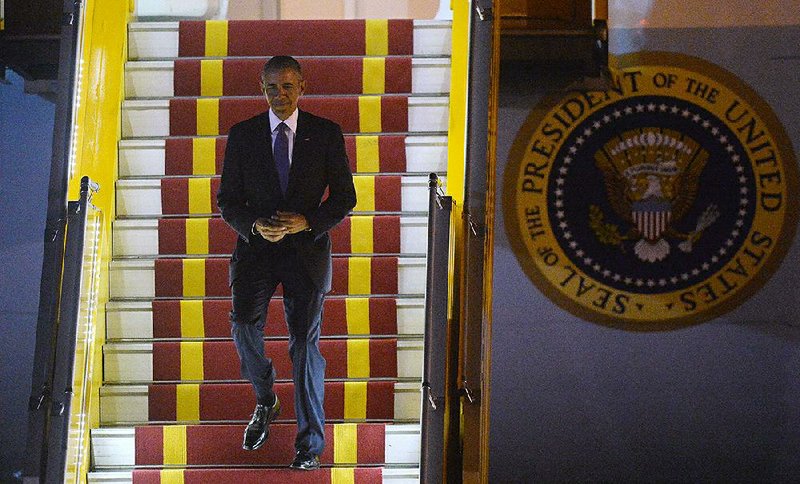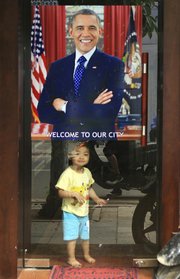HANOI, Vietnam -- President Barack Obama is in Hanoi as he begins his weeklong trip to Asia, where he plans to make the case for stronger commercial and security ties with Asian-Pacific allies anxious over the rise of an increasingly muscular China.
Obama arrived in Vietnam's capital late Sunday, becoming the third sitting U.S. president to visit that country since the end of the Vietnam War in 1973. This week's trip will also take him to Japan where he will attend a summit of the Group of Seven industrialized nations.
Four decades after the fall of Saigon and two decades after President Bill Clinton restored relations with Vietnam, Obama is eager to upgrade relations with that emerging power whose rapidly expanding middle class beckons as a promising market for U.S. goods.
During his three-day stay in Vietnam, he'll also make the case for U.S. approval of the 12-nation trans-Pacific trade agreement that is stalled in Congress and facing strong opposition from some 2016 presidential candidates.
Vietnam is hoping that Obama will use the visit to erase an irksome vestige of the war by lifting the U.S. partial embargo on selling arms to the country. The idea is under consideration, but concern about Vietnam's human-rights record is weighing against it.
In Japan, the uncertain global economy will be a top concern of the G-7 leaders. They'll also grapple with world challenges, including the fight against the Islamic State militant group in Iraq and Syria, the migrant crisis in Europe and Russian aggression. Also on the agenda will be Beijing's assertive claims in the South China Sea that are causing tensions with other countries in the region.
While the summit isn't expected to produce any breakthroughs, it gives leaders a rare opportunity to talk through the intractable difficulties they confront.
"Remember that leaders are lonely people," said Michael Green, senior vice president for Asia at the private Center for Strategic and International Studies based in Washington. "These people don't have much time to sit down with their peers to talk about common challenges."
For all of that, the culminating moment of Obama's trip will be a visit Friday to Hiroshima, where the U.S. dropped the atomic bomb that killed 140,000 people, ushering in the nuclear age seven decades ago. Another bomb killed 70,000 in Nagasaki three days later.
Obama will reflect on the devastating costs of war and try to give new impetus to the call for a nuclear-free world that he issued seven years ago in his first year as president.
For atomic bomb survivor Sunao Tsuboi, Obama's visit to Hiroshima has been a long time coming.
In 2009 when Obama took office, Tsuboi sent a letter to the White House on behalf of seven survivor organizations, inviting the president to visit the city. The invitation was declined.
With months remaining in Obama's second and final term in office, Tsuboi said he is grateful that the U.S. leader will pay a visit and deliver a message calling for the world to get rid of nuclear weapons.
"I welcome him with all my heart," Tsuboi said in an interview in Hiroshima. He was 20 when the bomb ripped through his hometown and killed his girlfriend. Now 91, he still carries the scars from the blast. He has received treatment for multiple illnesses throughout his life, including cancer.
Deputy national security adviser Ben Rhodes said the Vietnam and Japan visits reflect Obama's worldview "that we can move beyond difficult and complicated histories" to find areas of common interest.
"You could not have had a more violent conflict than we had with the Japanese in World War II, as a visit to Hiroshima will certainly mark, but now they are among our closest friends in the world," Rhodes said. "You could not have a more contested, controversial, costly, tragic war than the Vietnam War, and now [Vietnam] is becoming a partner of the United States, an important partner."
Still, concerns about human and political rights shadow the president's stay in Vietnam. In the lead-up to Obama's visit, the country freed a Catholic priest who had been one of its longest-held political prisoners. The U.S. remains concerned about government restrictions on citizens' political rights, and limits on civil liberties and free expression.
On Sunday, the country held parliamentary elections controlled by the Communist Party, which chooses who can stand for election. The results for elections to the 500-seat National Assembly are expected to be announced within 20 days. They are mostly a formality: The Communist Party has already chosen how many nonparty members have seats, according to advocacy group Human Rights Watch.
About 69 million people were eligible to vote for the 14th National Assembly. A total of 870 candidates were in the running. Of the 500 seats up for grabs, 458 must belong to the Vietnam Communist Party, which is the only party allowed to govern under the constitution. Among those running, 339 candidates were women, accounting for 38.97 percent, while 204 candidates were from ethnic minorities, making up 23.45 percent, according to the list of candidates released by the National Election Council in late April.
The Vietnamese government's response to recent unrest over mass fish deaths off the coast of Ha Tinh province prompted Human Rights Watch to call on Vietnamese leaders to put a stop to "harassment, intimidation and persecution" of environmental activists.
In an unprecedented show of defiance for the communist country, thousands of people have protested publicly in at least seven cities on recent Sundays to demand a transparent government investigation of the fish deaths. The protests were forcibly put down by security forces.
In advance of the president's visit, the White House invited representatives of Vietnam veterans organizations to trace progress in the U.S.-Vietnamese relationship. And it recruited Vietnamese civic leaders to underscore its commitment to promoting human and political rights in the country.
Rick Weidman, executive director for policy at the Vietnam Veterans of America, who participated in one of the meetings, said there still are wounds from Vietnam that need healing. He said the U.S. needs to do more to account for those still missing from the war and to help deal with ill effects from U.S. use of agent orange during the war. The administration is expected to announce more steps during Obama's visit to help with cleanup of the chemical herbicide.
Information for this article was contributed by Nancy Benac and Foster Klug of The Associated Press; and by Shoko Oda and Masatsugu Horie of Bloomberg News.
A Section on 05/23/2016

